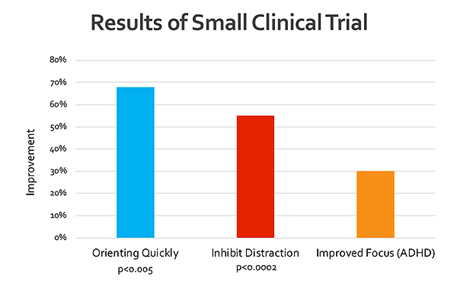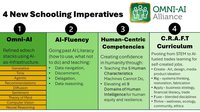SAN DIEGO, CALIF. - April 11, 2019 - BrainLeap Technologies, a software company that develops science-based interventions to help individuals with autism and ADHD lead fuller lives, today announces the launch of Attention Arcade, a suite of science-based training games that improve attention skills and reduce distractibility through gaze-driven games. Control of eye movements and attention are closely tied. Attention Arcade helps individuals with Autism Spectrum Disorder (ASD) and Attention-Deficit/Hyperactivity Disorder (ADHD) increase orienting speed and focus by using an eye tracker rather than a mouse or keyboard to play games that are designed to train multiple aspects of attention.
In a research study at UC San Diego, the attention training games increased orienting attention by 68% and reduced distractibility by 55%, as well as improved focus by 30% in individuals with ADHD symptoms. These results were measured by independent attention assessments and initial results have been published in the peer-reviewed journal Developmental Neurobiology.

Based on 30 years of research, the Attention Arcade trains the skills that underlie academic performance, executive function, and classroom readiness. Independent assessments of attention are included in the suite to ensure that transferable improvements are being made. Attention Arcade is ideal for ages 7-14 and designed for use in homes and schools.
Jeff Coleman, CEO of BrainLeap, shares, “While many children with autism and ADHD receive pharmaceuticals to mitigate some of their attention challenges, medication has a limited impact because it does not teach children how to focus. The Attention Arcade is a type of exercise for the brain that helps kids understand how to focus and develop the underlying skills to do it, whether they continue to use medication or not.”
Each of the six games trains different aspects of attention:
The goal of Dr. Mole & Mr. Hide is to hit bandit moles as they pop out of the ground, while avoiding looking at the professor moles. As the game progresses, the moles appear more quickly and from more locations. The game trains the ability to quickly and accurately orient the player’s gaze and attention to a sudden event, and to monitor a wide range of view. As the game progresses, inhibitory control is also developed as the player avoids looking at the professor moles.
In Shroomdigger, the player searches for mushroom-shaped houses in a mystical landscape. Focusing gaze on a mushroom house causes it to grow until it explodes. The goal is to find all the shrooms before time runs out. The game trains attention by requiring steady fixation of gaze, visual search in a crowded field, and the ability to ignore moving distractions.
In Space Race, the player uses gaze to steer a ship through a cosmic race course, aiming for green gates, avoiding red gates, and collecting stars for bonus points. The game trains anticipatory focus by requiring the player to gaze ahead of the current ship position. Executive
functions related to planning are trained by the need to quickly decide whether collecting a star will leave enough time to avoid a red gate that causes damage to the ship.
In Kung Fall, the player trains a ninja for the Dojo’s Aerial Skills exam. Using gaze, the player guides the ninja to land and balance on a series of rock pillars while avoiding birds and ignoring falling cherry blossoms. The game trains planning, steady fixation of attention and gaze, and the ability to ignore moving distractions.
Butterfly Bob flies through a peaceful landscape, collecting nectar and avoiding bugs. The player uses gaze to guide Bob vertically, flying higher or lower as needed. The game trains anticipatory focus, planning, and prioritization.
In Trapped-a-Zoid, the player uses gaze to steer a spaceship to avoid colliding with neighboring ships. It trains inhibitory control of attention, requiring the player to suppress salient visual input while gazing into the empty space where the spaceship will be safe. Executive functions are trained by engaging top-down strategy planning.
About BrainLeap
BrainLeap is a software company that develops science-based interventions to help individuals
with autism and ADHD lead fuller lives. Based on 30 years of academic research, our gaze-
driven training games improve attention skills and reduce distractibility, which supports better
academic performance and improved executive function.
PR Contact:
Michelle Stansbury
(619) 663-9704










